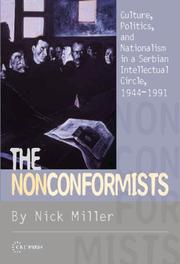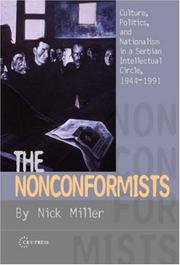| Listing 1 - 10 of 14 | << page >> |
Sort by
|

ISBN: 9786155211362 9639776130 9637326936 9789637326936 9786611376864 2821815085 1281376868 1429499605 6155211361 9781429499606 9781281376862 9789639776135 9782821815087 6611376860 Year: 2007 Publisher: Budapest New York Central European University Press
Abstract | Keywords | Export | Availability | Bookmark
 Loading...
Loading...Choose an application
- Reference Manager
- EndNote
- RefWorks (Direct export to RefWorks)
Serbia's national movement of the 1980s and 1990s, the author suggests, was not the product of an ancient, immutable, and aggressive Serbian national identity; nor was it an artificial creation of powerful political actors looking to capitalize on its mobilizing power. Miller argues that cultural processes are too often ignored in favor of political ones; that Serbian intellectuals did work within a historical context, but that they were not slaves to the past. His subjects are Dobrica Ćosić (a novelist), Mića Popović (a painter) and Borislav Mihajlović Mihiz (a literary critic). These three influential Serbian intellectuals concluded by the late 1960s that communism had failed the Serbian people; together, they helped forge a new Serbian identity that fused older cultural imagery with modern conditions.
Ćosić, Dobrica, --- Popović, Mića --- Mihajlović-Mihiz, Borislav, --- Popović, Miodrag-Mića --- Popoviḱ, Miḱa --- Поповић, Мића --- SRS --- RS de Serbije --- SR Srbija --- Srbija --- Servia --- Sot︠s︡ialisticheskai︠a︡ Respublika Serbii︠a︡ --- Serbii︠a︡ --- Narodna Republika Srbija --- N.R. Serbii︠a︡ --- NR Serbii︠a︡ --- Socialist Republic of Serbia --- Republic of Serbia --- Socijalistička Republika Srbija --- Republika Srbija --- People's Republic of Serbia --- Szerbia --- Србија --- Intellectuals --- Intelligentsia --- History --- Criticism and interpretation. --- Serbia --- Intellectual life --- Mihajlović-Mihiz, Borislav, --- Popović, Mića --- Ćosić, Dobrica, --- Persons --- Social classes --- Specialists --- Tchossitch, Dobritsa, --- Ḱosiḱ, Dobrica, --- Ćosić, Dobroslav, --- Ћосић, Добрица, --- Serbia and Montenegro --- Mihiz, Borislav Mihajlović-, --- Mihajlović, Borislav, --- Михиз, Борислав Михаијловић, --- Михаијловић-Михиз, Борислав, --- 20th century, Communism, History, Identity, Intellectuals, Nationalism, Serbia, Yugoslavia.

ISBN: 9786155211362 6155211361 2821815085 1281376868 9786611376864 1429499605 9637326936 9639776130 Year: 2007 Publisher: Budapest New York
Abstract | Keywords | Export | Availability | Bookmark
 Loading...
Loading...Choose an application
- Reference Manager
- EndNote
- RefWorks (Direct export to RefWorks)
Serbia's national movement of the 1980s and 1990s, the author suggests, was not the product of an ancient, immutable, and aggressive Serbian national identity; nor was it an artificial creation of powerful political actors looking to capitalize on its mobilizing power. Miller argues that cultural processes are too often ignored in favor of political ones; that Serbian intellectuals did work within a historical context, but that they were not slaves to the past. His subjects are Dobrica Ćosić (a novelist), Mića Popović (a painter) and Borislav Mihajlović Mihiz (a literary critic). These three influential Serbian intellectuals concluded by the late 1960s that communism had failed the Serbian people; together, they helped forge a new Serbian identity that fused older cultural imagery with modern conditions.
Intellectuals --- History --- Ćosić, Dobrica, --- Popović, Mića --- Mihajlović-Mihiz, Borislav, --- Criticism and interpretation. --- Serbia --- Intellectual life --- 20th century, Communism, History, Identity, Intellectuals, Nationalism, Serbia, Yugoslavia. --- Intelligentsia --- Persons --- Social classes --- Specialists --- Popović, Miodrag-Mića --- Popoviḱ, Miḱa --- Поповић, Мића --- Mihiz, Borislav Mihajlović-, --- Mihajlović, Borislav, --- Михиз, Борислав Михаијловић, --- Михаијловић-Михиз, Борислав, --- Tchossitch, Dobritsa, --- Ḱosiḱ, Dobrica, --- Ćosić, Dobroslav, --- Ћосић, Добрица, --- N.R. Serbii︠a︡ --- Narodna Republika Srbija --- NR Serbii︠a︡ --- People's Republic of Serbia --- Republic of Serbia --- Republika Srbija --- RS de Serbije --- Serbii︠a︡ --- Servia --- Socialist Republic of Serbia --- Socijalistička Republika Srbija --- Sot︠s︡ialisticheskai︠a︡ Respublika Serbii︠a︡ --- SR Srbija --- Srbija --- SRS --- Szerbia --- Србија --- Serbia and Montenegro --- Cosic, Dobrica, --- Popovic, Mica --- Mihajlovic-Mihiz, Borislav,
Book
ISBN: 0713519363 Year: 1975 Publisher: London : Bell,
Abstract | Keywords | Export | Availability | Bookmark
 Loading...
Loading...Choose an application
- Reference Manager
- EndNote
- RefWorks (Direct export to RefWorks)
Book
ISBN: 0822977222 0585043892 Year: 1997 Publisher: Pittsburgh, Pennsylvania : University of Pittsburgh Press,
Abstract | Keywords | Export | Availability | Bookmark
 Loading...
Loading...Choose an application
- Reference Manager
- EndNote
- RefWorks (Direct export to RefWorks)
Miller chronicles the politics in Croatia prior to the first World War. The failures of the Croat-Serbian Coalition led to their inability to create a cohesive civic/democratic union during the war years, and prevail to this day.
Serbs --- Politics and government. --- Croatia --- Politics and government
Book
ISBN: 9781912300938 Year: 2022 Publisher: Bristol : SRA Books,
Abstract | Keywords | Export | Availability | Bookmark
 Loading...
Loading...Choose an application
- Reference Manager
- EndNote
- RefWorks (Direct export to RefWorks)
Digital
ISBN: 9786155211362 Year: 2007 Publisher: Budapest ;; New York Central European University Press
Abstract | Keywords | Export | Availability | Bookmark
 Loading...
Loading...Choose an application
- Reference Manager
- EndNote
- RefWorks (Direct export to RefWorks)
Digital
ISBN: 9786155211362 Year: 2007 Publisher: Budapest ; New York CEU Press
Abstract | Keywords | Export | Availability | Bookmark
 Loading...
Loading...Choose an application
- Reference Manager
- EndNote
- RefWorks (Direct export to RefWorks)
Book

ISBN: 9786155053085 9786155053054 9786155053061 6155053065 1283256665 9781283256667 9786155053047 6155053049 6155053057 9786613256669 Year: 2022 Publisher: Budapest New York
Abstract | Keywords | Export | Availability | Bookmark
 Loading...
Loading...Choose an application
- Reference Manager
- EndNote
- RefWorks (Direct export to RefWorks)
This book is a state of the art reassessment of the significance and consequences of the events associated with the year 1968 in Europe and in North America. Since 1998, there hasn't been any collective, comparative and interdisciplinary effort to discuss 1968 in the light of both contemporary headways of scholarship and new evidence on this historical period. A significant departure from earlier approaches lies in the fact that the manuscript is constructed in unitary fashion, as it goes beyond the East–West divide, trying to identify the common features of the sixties. The latter are analyzed as simultaneously global and local developments. The main problems addressed by the contributors of this volume are: the sixties as a generational clash; the redefinition of the political as a consequence of the ideological challenges posed to the status-quo by the sixty-eighters; the role of Utopia and the de-radicalization of intellectuals; the challenges to imperialism (Soviet/American); the cultural revolution of the sixties; the crisis of 'really existing socialism' and the failure of "socialism with a human face"; the gradual departure from the Yalta-system; the development of a culture of human rights and the project of a global civil society; the situation of 1968 within the general evolution of European history (esp. the relationship of 1968 with 1989). In contrast to existing books, it provides a fundamental and unique synthesis of approaches on 1968: first, it contains critical (vs. nostalgic) re-evaluations of the events from the part of significant sixty-eighters; second, it includes historical analyses based on new archival research; third, it gathers important theoretical re-assessments of the intellectual history of the 1968; and fourth, it bridges 1968 with its aftermath and its pre-history, thus avoiding an over-contextualization of the topics in question.
Social movements --- Democracy --- Mouvements sociaux --- Démocratie --- Hungary --- Hongrie --- Politics and government --- Politique et gouvernement --- Nineteen sixty-eight, A.D. --- 1968 A.D. --- Nineteen hundred sixty-eight, A.D. --- Year nineteen sixty-eight, A.D. --- Nineteen sixties --- Movements, Social --- Social history --- Social psychology --- History --- Europe --- Council of Europe countries --- Eastern Hemisphere --- Eurasia --- 1968, Cold War, Ideology, Political philosophy, Political studies, Communism.
Book

ISBN: 9786155053672 6155053677 1283594056 9786613906502 9786155053658 6155053650 9781283594059 Year: 2022 Publisher: Budapest New York
Abstract | Keywords | Export | Availability | Bookmark
 Loading...
Loading...Choose an application
- Reference Manager
- EndNote
- RefWorks (Direct export to RefWorks)
A fresh interpretation of the contexts, meanings, and consequences of the revolutions of 1989, coupled with state of the art reassessment of the significance and consequences of the events associated with the demise of communist regimes. The book provides an analysis that takes into account the complexities of the Soviet bloc, the events' impact upon Europe, and their re-interpretation within a larger global context. Departs from static ways of analysis (events and their significance) bringing forth approaches that deal with both pre-1989 developments and the 1989 context itself, while extensively discussing the ways of resituating 1989 in the larger context of the 20th century and of its lessons for the 21st.Emphasizes the possibility for re-thinking and re-visiting the filters and means that scholars use to interpret such turning point. The editors perceive the present project as a challenge to existing readings on the complex set of issues and topics presupposed by a re-evaluation of 1989 as a symbol of the change and transition from authoritarianism to democracy.
Revolutions --- Insurrections --- Rebellions --- Revolts --- Revolutionary wars --- History --- Political science --- Political violence --- War --- Government, Resistance to --- Europe, Eastern --- Romania --- East Europe --- Eastern Europe --- Government of Romania --- Lo-ma-ni-ya --- Luomaniya --- R.N.R. --- R.P.R. --- R.P. Romînă --- R.S.R. --- Republica Populară Romînă --- Republica Socialistă România --- Rhowmenia --- RNR --- Román Szocialista Köztársaság --- Romāniyā --- Romanyah --- Roumania --- Roumanie --- RP Romînă --- RPR --- RSR --- Rumania --- Rumänien --- Rumenyah --- Rumenye --- Rumunia --- Rumŭnii︠a︡ --- Rumunsko --- Rumynii︠a︡ --- Rumynskai︠a︡ Narodnai︠a︡ Respublika --- Румыния --- ルーマニア --- 羅馬尼亞 --- 루마니아 --- Moldavia --- Wallachia --- Democratization, Intellectuals, Media, Political studies, Postcommunism, Regime change, Transition. --- Tismaneanu, Vladimir. --- Iacob, Bogdan. --- Iacob, Bogdan --- Iacob, Bogdan C. --- Iacob, Bogdan Cristian --- Iacob, Bogdan Christian --- Tismaneanu, W. Vladimir --- Tismăneanu, V. --- Royaume de Roumanie
Digital

ISBN: 9780748635788 9780748635764 Year: 2022 Publisher: Edinburgh Edinburgh University Press
Abstract | Keywords | Export | Availability | Bookmark
 Loading...
Loading...Choose an application
- Reference Manager
- EndNote
- RefWorks (Direct export to RefWorks)
| Listing 1 - 10 of 14 | << page >> |
Sort by
|

 Search
Search Feedback
Feedback About UniCat
About UniCat  Help
Help News
News